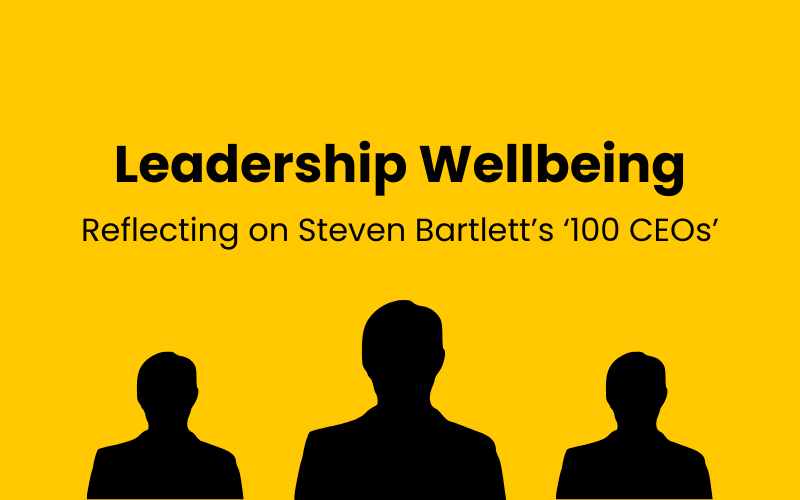Why Steven Bartlett’s ‘100 CEOs’ Matters for Leadership Wellbeing

Last year, I set my mission to break the stigma of mental health and wellbeing in leadership. Not just to talk about burnout or stress, but to challenge the silence leaders carry, the masks they wear, and the pressure they quietly absorb.
So when Steven Bartlett launched his “100 CEOs” project, I paid attention. Each week, he asks leaders a single, thought-provoking question and shares their responses publicly. It’s raw. It’s honest. It’s unfiltered in a way leadership conversations usually aren’t.
For a long time, the stories leaders shared were polished highlight reels. Now, for the first time at scale, we’re seeing leaders talk openly about the emotional realities behind their roles. And for someone on a mission like mine, this is a welcome shift.
One person alone cannot change leadership culture. But many voices, speaking honestly at the same time, can. This project is helping spark a collective conversation that has been needed for years.
Below are five themes that keep showing up, and they reveal something powerful about where leadership is heading.
The five themes that leaders keep returning to…
1. Loneliness at the top
Even at the height of success, many leaders describe leadership as isolating. Brian Chesky, CEO of Airbnb, captured it bluntly:
“No one told me how lonely this journey would be.”
Brian Chesky, Airbnb
Leadership creates distance, even when you’re surrounded by people. That loneliness is rarely acknowledged, yet it drives decisions, behaviours, and burnout more than most leaders dare admit.
2. The pressure to always look certain
The expectation to never waiver, never doubt, never question. Carl Hazeley from Finimize put it simply:
“CEOs need to be seen to be completely certain.”
Carl Hazeley, Finimize
It’s a mask leaders wear constantly. Certainty as performance. Strength as armour. It’s exhausting, it’s unsustainable, and it’s one of the biggest barriers to honesty inside organisations.
3. Fear of being judged for struggling
So many leaders act strong while privately fearing what struggle might signal. One founder highlighted the weight of trying to look composed:
“Acting confident while second-guessing everything.”
Quoted from the series poll
It’s the silent rule of leadership, stay strong, or be seen as unfit. That mindset punishes vulnerability and prevents leaders from asking for support when they need it most.
4. The emotional cost of responsibility
Some decisions cut deeply, not because they’re strategic, but because they affect real people. Kiran Kachela described the internal strain leaders feel:
“The right decision isn’t always the easiest.”
Kiran Kachela, CI Projects
Leaders absorb consequences quietly. They protect their teams from the emotional fallout, often at the expense of their own wellbeing.
5. The hidden grind behind growth
Behind every “overnight success” sits a mountain of strain. Raquel Bouris, founder of WHO IS ELIJAH, said it plainly:
“The nights you don’t sleep because you don’t know how you will make payroll.”
Raquel Bouris, WHO IS ELIJAH
This is the unglamorous reality leaders rarely share, the anxiety, the financial fear, the pressure to keep going even when your body is begging you to stop.
This is what change looks like
For years, business culture rewarded silence. Now, leaders are cracking it open themselves. Steven’s project amplifies something vital, the human experience behind leadership performance.
And this is important, because when leaders speak honestly, even in small ways, it dismantles stigma rather than creating it. These CEOs aren’t exposing weakness, they’re showing strength. They’re proving that being human does not disqualify you from leading. It actually makes you better at it.
And it takes all of us.
His platform, my mission, and every leader who’s brave enough to speak up.
One person can start a conversation, but it takes a crowd to shift a culture.
Leadership doesn’t need more pressure.
Leadership needs more truth.
And truth grows louder when more people are willing to speak it.